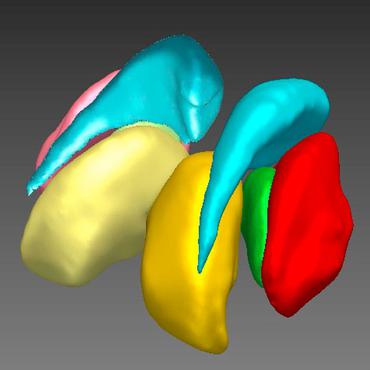Search Results for author: Seyed Sadegh Mohseni Salehi
Found 9 papers, 3 papers with code
Dual-Domain Self-Supervised Learning for Accelerated Non-Cartesian MRI Reconstruction
no code implementations • 18 Feb 2023 • Bo Zhou, Jo Schlemper, Neel Dey, Seyed Sadegh Mohseni Salehi, Kevin Sheth, Chi Liu, James S. Duncan, Michal Sofka
To this end, we present a fully self-supervised approach for accelerated non-Cartesian MRI reconstruction which leverages self-supervision in both k-space and image domains.
ContraReg: Contrastive Learning of Multi-modality Unsupervised Deformable Image Registration
no code implementations • 27 Jun 2022 • Neel Dey, Jo Schlemper, Seyed Sadegh Mohseni Salehi, Bo Zhou, Guido Gerig, Michal Sofka
Establishing voxelwise semantic correspondence across distinct imaging modalities is a foundational yet formidable computer vision task.
DSFormer: A Dual-domain Self-supervised Transformer for Accelerated Multi-contrast MRI Reconstruction
no code implementations • 26 Jan 2022 • Bo Zhou, Neel Dey, Jo Schlemper, Seyed Sadegh Mohseni Salehi, Chi Liu, James S. Duncan, Michal Sofka
To these ends, we present a dual-domain self-supervised transformer (DSFormer) for accelerated MC-MRI reconstruction.
Deep Predictive Motion Tracking in Magnetic Resonance Imaging: Application to Fetal Imaging
2 code implementations • 25 Sep 2019 • Ayush Singh, Seyed Sadegh Mohseni Salehi, Ali Gholipour
Nevertheless, visual monitoring of fetal motion based on displayed slices, and navigation at the level of stacks-of-slices is inefficient.
Asymmetric Loss Functions and Deep Densely Connected Networks for Highly Imbalanced Medical Image Segmentation: Application to Multiple Sclerosis Lesion Detection
no code implementations • 28 Mar 2018 • Seyed Raein Hashemi, Seyed Sadegh Mohseni Salehi, Deniz Erdogmus, Sanjay P. Prabhu, Simon K. Warfield, Ali Gholipour
One of the major challenges in training such networks raises when data is unbalanced, which is common in many medical imaging applications such as lesion segmentation where lesion class voxels are often much lower in numbers than non-lesion voxels.
Real-time Deep Pose Estimation with Geodesic Loss for Image-to-Template Rigid Registration
no code implementations • 15 Mar 2018 • Seyed Sadegh Mohseni Salehi, Shadab Khan, Deniz Erdogmus, Ali Gholipour
Our results show that in such registration applications that are amendable to learning, the proposed deep learning methods with geodesic loss minimization can achieve accurate results with a wide capture range in real-time (<100ms).
Real-Time Automatic Fetal Brain Extraction in Fetal MRI by Deep Learning
1 code implementation • 25 Oct 2017 • Seyed Sadegh Mohseni Salehi, Seyed Raein Hashemi, Clemente Velasco-Annis, Abdelhakim Ouaalam, Judy A. Estroff, Deniz Erdogmus, Simon K. Warfield, Ali Gholipour
We aimed to develop a fully automatic segmentation method that independently segments sections of the fetal brain in 2D fetal MRI slices in real-time.
Tversky loss function for image segmentation using 3D fully convolutional deep networks
2 code implementations • 18 Jun 2017 • Seyed Sadegh Mohseni Salehi, Deniz Erdogmus, Ali Gholipour
One of the main challenges in training these networks is data imbalance, which is particularly problematic in medical imaging applications such as lesion segmentation where the number of lesion voxels is often much lower than the number of non-lesion voxels.
Auto-context Convolutional Neural Network (Auto-Net) for Brain Extraction in Magnetic Resonance Imaging
no code implementations • 6 Mar 2017 • Seyed Sadegh Mohseni Salehi, Deniz Erdogmus, Ali Gholipour
Brain extraction or whole brain segmentation is an important first step in many of the neuroimage analysis pipelines.










